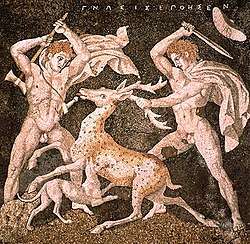Peritas
Peritas (Greek: Περίτας) was Alexander the Great's favorite dog, who accompanied him during his military exploits. The name Peritas seems to come from the Macedonian word for January.[2]
 | |
| Species | Dog |
|---|---|
| Breed | Mastiff, Laconian |
| Sex | Male |
| Occupation | Hunting dog and Military mascot |
| Owner | Alexander the Great |
| Named after | January |
History
The eponymous city
Not much is known of the historical Peritas aside from a city named in his honor. Peritas' death, however it happened, was a venerable one. Like Alexander's horse Bucephalus, Peritas was awarded a city named in his honor, with a monument to his glory in its central square.[3][4] According to Plutarch, after recalling the story of Bucephalus, "It is said, too, that when he lost a dog also, named Peritas, which had been reared by him and was loved by him, he founded a city and gave it the dog's name."[3] The city was probably somewhere in India, perhaps not far from the town named after Bucephalus, since both cities would have been the spoils of war for Alexander after having defeated King Porus at the Battle of the Hydaspes.[5]
Breed
The breed of Peritas is hard to ascertain and remains unknown. Peritas is sometimes referred to as a Molosser[6] or Bulldog,[4] perhaps from the fierce nature of a few stories. Others will say Peritas would have been the Laconian,[7] or hound,[8], as depicted in the mosaic.
Tales of Peritas
According to Pliny, it was perhaps his uncle Alexander the Molossian, king of Epirus (NW Greece), who delighted Alexander by giving him a dog which had attacked and beaten both a lion and an elephant.[9] There is also the story of Alexander meeting Sophytes, a ruler of an area probably around Jech Doab in Punjab.[10] Sophytes gave Alexander one hundred and fifty dogs known for their fearsome strength and courage. Wishing to test their strength, Sophytes had a lion fight two of the weakest dogs. He released two others to help once those two seemed at a disadvantage. The four were doing well against the lion when Sophytes sent a man with a scimitar to hack at a leg of one of the dogs. Alexander protested strongly, and guards took the man with the blade away, until Sophytes offered Alexander three dogs for that one. The dog then calmly accepted its fate without making a sound, and continued to have a firm bite on the lion until it had succumbed to its loss of blood.[11] It is unsure whether any of these pertain to Peritas.
One tale about the dog involves its biting the lip of an elephant in the Battle of Gaugamela against Persia's Darius III,[12] resulting in the dog's death. Perhaps this is the story of Pliny's embellished. Another says when Alexander was trapped behind Mallian fortifications, Leonnatus heard Peritas howl from behind him. While still fighting, Leonnatus told Peritas to run to Alexander; and Peritas attacked the Mallians, who had just wounded Alexander with a javelin. This allowed the troops to salvage Alexander in time. In saving Alexander, Peritas had also been wounded by a javelin, dying in his master's lap.[6]
Popular media
Peritas appears as a posthumous character in the 2020 animated film Scoob!. He is depicted as Scooby-Doo's distant ancestor and a Great Dane whose bond with Alexander the Great sealed the gates of the Underworld. Due to his relation to Peritas, Scooby is the only one who can open the gates, making him the target of the film's antagonist, Dick Dastardly.
References
- Andrew Chugg (2006). Alexander's Lovers. Raleigh, N.C.: Lulu. pp. 78–79.
- John Maxwell O'Brien (1994). Alexander the Great: The Invisible Enemy. Psychology Press. p. 155. ISBN 978-0-415-10617-7.
- Plutarch's Life of Alexander 61. Plutarch claims this information came from Sotion who heard it from Potamon the Lesbian.
- John Kistler (2011). Animals in the Military: From Hannibal's Elephants to the Dolphins of the U.S. Navy. ABC-CLIO. pp. 5–6. ISBN 978-1-59884-346-0.
- Charles Harcourt Ainslie Forbes-Lindsay (1903). India, Past and Present. 1. John C. Winston. pp. 33–34.
- Ryan O'Meara (2011). Clever Dog: Life Lessons From the World's Most Successful Animal. Veloce Publishing. p. 16. ISBN 978-1-84584-345-8.
- Cynthia A. Branigan (2004). The Reign of the Greyhound: a Popular History of the Oldest Family of Dogs (2nd ed.). John Wiley & Sons. p. 50. ISBN 978-0-7645-4445-3.
- Pliny, Natural History Book VIII. pp. 149–150.
- Pierre Herman Leonard Eggermont (1993). Alexander's Campaign In Southern Punjab. Peeters Publishing. p. 16. ISBN 978-9-06831-499-1.
- Diod. Sic. 17.92
- E. Bougerol (November 1, 2007). "Ten dogs that changed the world". CNN. Archived from the original on October 25, 2010. Retrieved November 19, 2011.